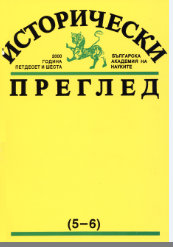Задграничното представителство на нацията – алтернатива за българите през Възраждането (до Парижкия мирен договор 1856 г.)
The Representation Abroad of the Nation - An Alternative for the Bulgarians (up to the Paris Peace Treaty 1856)
Author(s): Ognyana Mazhdrakova-ChavdarovaSubject(s): History, Political history, Modern Age, Special Historiographies:, 19th Century, The Ottoman Empire
Published by: Институт за исторически изследвания - Българска академия на науките
Keywords: Bulgarian National Revival; anti-Ottoman movements; Bulgarian Catholic prelates; Peter Parchevich; Peter Bogdan; all-Christian ideological platform
Summary/Abstract: The selfless struggle of the Bulgarian people for liberation for decades was part of the general flow of the anti-Ottoman movements and the disturbances that often flared up in European Turkey. On a comparative basis in the article are noted the different possibilities and practice of the neighbouring Balkan peoples that since long had prepared the international conditions so that the Great Powers might meet their political demands in the process of emancipation by the suzerain until full sovereignty was obtained. In this context emerged the extremely unfavourable political status of the Bulgarian people who had to count on and to act mainly by their emigration so as to defend and popularize their liberation cause before Europe. A long time had to pass before our liberation movement be accepted as a subject of international law and the Bulgarian question be put on the diplomatic table. No outstanding Bulgarian actions were recorded in the political and diplomatic sphere in the 18th c., unlike the 18th c. when the strivings for the restoration of the Bulgarian State were defended by diplomats of European magnitude such as the Bulgarian Catholic prelates Peter Parchevich and Peter Bogdan. The absence of institutional support in the –motherland narrowed the opportunities and competence of the Bulgarian Orthodox bishops during the 18th c. Indicative was the example of the highly educated Bulgarian cleric Partenii Pavlovich, active in the diplomatic field and selflessly serving the whole Orthodox Southern Slav community but without limiting the interests of his people, motivated by the all-Christian ideological platform. For the first time the functions of an emigre national representation were taken up by the All-Bulgarian Political Centre that was set up in Bucharest, headed by Sophronius of Vratsa during the first decade of the 19th c. Then was realized also the mission of the first all-Bulgarian National Revival “diplomats” in Russia – I. Zambin and A. Nekovich, recognized by the St. Petersburg official circles as rightful Bulgarian “deputies” and Sophronius – as actual representative of the Bulgarian people. Tactfully was formulated the long-terms request for political autonomy in the forms of a plan for protection by Russia, based on its internationally recognized right to be “protector” of all the Orthodox subjects of the Sultan. Up to 1856 emerged a whole galaxy of worthy representatives of the Bulgarian people, acting on its behalf as pre-state “diplomats” of a sort who had taken upon themselves foreign policy at the initiative of one or other formation of the national liberation movement, without material benefits and without immunity, inspired by their profound patriotic sentiments. Most numerous and prolonged were the diplomatic demarches and appeals directed to the Great Power that was the most active in the Balkans – Russia. Before it acted Alexander Pavlovich Nekovich, Dr I. Seliminski, T. Dobrovski, N. H. Palauzov, S. Palauzov, I. Batsov, as well C. Petcovich, N. Gerov, I. Kishevski, Sava Filaretov and others. In the 1840s were noted the founders of the first Bulgarian political centre in Western Europe for propaganda and defence of the Bulgarian cause – the operating in Paris Alexander Stoilov Exarch, Dr Peter Beron, Dr Nikola Piccolo, etc. During the Crimean War the commitment of official Russia to the solution of the Bulgarian Question was supported by the whole spectrum of ideological currents and groupings of the Bulgarian emigration. Rivalry appeared, however, between the two principal formations: the Central Trusteeship in Bucharest (the future Benevolent Society) and the Odessa Bulgarian Board of Trustees, both claiming to lead the liberation movement and in the event of peace negotiations to represent and defend the interests of the Bulgarian nation. The problem of a united and more effective representation abroad remained open also during the next period of the Bulgarian national liberation movement.
Journal: Исторически преглед
- Issue Year: 2000
- Issue No: 5-6
- Page Range: 22-55
- Page Count: 34
- Language: Bulgarian
- Content File-PDF

